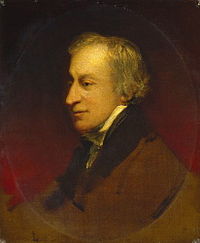Search
Search>> Arts/Entertainment>> Music>> United Kingdom>> Samuel WesleySamuel Wesley

Born February 24, 1766 - Died October 11, 1837
Samuel Wesley was a British composer.
Wesley was born on February 24th, 1766 in Bristol, England. His entire family was Methodist and his uncle, John Wesley, founded the Methodist Church. He came from a musical family, his father composed hymns for the Methodist Church and his mother often sang and played them on the harpsichord. From a young age, Wesley was considered a prodigy. By the age of eight he was composing his own music and had mastered the violin, harpsichord and organ. Some referred to Wesley as the English Mozart.
By 1778, Wesley's father had purchased a second home in London and Wesley moved there. Sometime after moving to London, Wesley met his future wife. At some point prior to 1793, Wesley declared to his mother he was of the philosophy his marriage was constituted by sexual intercourse and there was no need to for a formal ceremony. This was scandalous at the time and by 1793 the couple were married and had three children. The marriage didn't last when Wesley's wife discovered he was having an affair with a teen aged girl. Wesley had 4 more children in this new relationship, the two never married.
Wesley struggled most of life to find work. This has been attributed to his outspoken manner, his marriage arrangements and some anecdotal evidence he was unreliable.
Shortly before his passing Wesley was introduced to Felix Mendelssohn. When Mendelssohn gave a performance, he asked Wesley to play as well. Mendelssohn stood by him as he played complimenting his performance. To Mendelssohn's compliments Wesley replied "Ah, Sir! you have not heard me play; you should have heard me forty years ago."
It is believed at some point in his life, Wesley became a Roman Catholic, much to the chagrin of his Methodist family. According to some information, including his obituary, he denied the conversion every took place. He did compose a mass he dedicated to Pope Pius VI.
Wesley passed away on October 11th, 1837.
Wesley was raised in Lodge of Antiquity No. 1 in London at the age of 22. He was appointed as the first Grand Organist of the Grand Lodge of the Moderns. A year later he was present when the two Grand Lodges merged to form the United Grand Lodge of England. After the merging he was Grand Organist for the United Grand Lodge of England until 1818. He composed many different songs for the use of the Freemasonry and even composed a piece specifically for the first official communication of the newly formed United Grand Lodge of England.
This article provided by Brother Eric C. Steele.